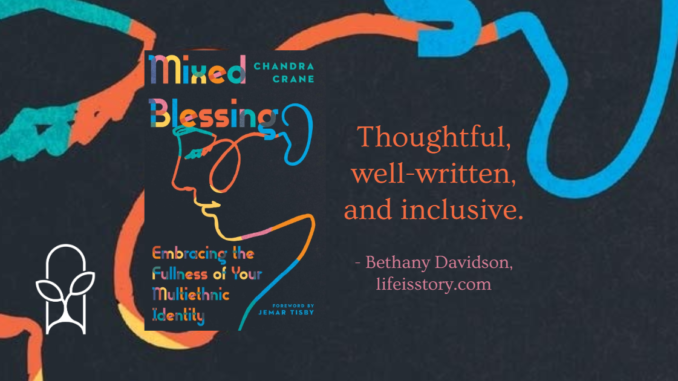
Published by IVP on December 15, 2020
Genres: Non-Fiction, Adoption, Christian Life, Memoir, Racial Reconciliation
Buy on Amazon
Goodreads

"So what are you?" Chandra Crane knows what it's like to get that question. She has a Thai birth father, a European American mother, and an African American father who adopted her when she was five. With this mixed multiethnic and multicultural background, she has keenly felt the otherness of never quite fitting in. Where do people of mixed ethnicity belong? Those of us with multiethnic backgrounds may have pain surrounding our mixed heritage. But we also have the privilege and potential to serve the Lord through our unique experiences. Crane explores what Scripture and history teach us about ethnicity and how we can bring all of ourselves to our sense of identity and calling. Discover the fullness of who you are. Find out how your mixed identity can be a blessing to yourself and to the world around you.
Chandra Crane adds a significant perspective to current conversations about race, highlighting the experiences of multiethnic and multicultural people. She writes to them directly throughout the book, while also encouraging monoethnic people of different races to come along and join the conversation. I found this book helpful and enlightening, as it both confirmed things that I already understood about multicultural experiences and introduced different perspectives that I had never thought about before. She writes about her personal experiences, broader issues in society, and stories from other multiethnic people with a variety of different backgrounds. She also makes an effort to include voices of people who are adopted, because even though transracial adoption is not this book’s focus, it complicates existing multiethnic identities and creates multicultural experiences within the family.
This book validates common experiences for people with complex cultural backgrounds and different appearances. In one chapter, Crane tells a story about how, when people at her Christian organization split up into their racial and ethnic groups to discuss the dynamics of ministry in their particular contexts, she had no idea where to go. She uses this as a metaphor for her overall experience, and later writes more about dynamics within society and the church. Her Christian perspective is mostly referential in the first parts of the book, but she fully articulates spiritual elements near the end, particularly exploring how “identity in Christ” does not erase our ethnic and cultural identities as Christians or in the church. She also mentions mixed race Bible characters at another point. I wish that she had gone into more detail about this, but she had a lot to cover.
Insightful Reflections
It is much easier to nitpick a book like this than to write it, and even though no one will agree with everything Crane says, this is an excellent conversation starter. Crane addresses lots of different issues, and even though parts of the book are repetitive, I can completely relate to repeating the same thing five times in different words in hope that someone will understand. I appreciate her willingness to explore a fraught and rarely addressed topic, and I found her reflections on cultural appropriation very insightful. I had never thought before about how someone with a mixed identity might have to deal with someone accusing them of cultural appropriation as they explore an aspect of their identity that is invisible or secondary in the eyes of others.
In relation this, she writes about the differences between stereotypes and prototypes, helping people see that it is okay to have a general, cultural sense of what a group is like, as long as it is positive, loving, and not limiting. I also appreciate how, even though she pushes back against ideas of “White normativity,” she makes space for people with white roots to connect with all aspects of their heritage, rather than exclusively identifying as people of color. Even though she writes about how she has navigated white privilege within her mixed identity, she encourages people with white ethnic roots to learn about the culture that their ancestors came from.
Challenges for the Future
This book has great takeaways for monoethnic Christians, and can help church leaders, organization members, family members, and friends broaden their awareness of the world and of other people’s experiences. Crane provides a fair critique of multiethnic churches and diversity ministries that focus on monoethnic identities while neglecting to acknowledge or validate the experiences of people who do not fit within clearly defined racial categories, and as she writes about the “internal disconnect” that many mixed people experience, she provides examples of how important it is for people to feel welcomed in all of their fullness. I would recommend this book to any Christian who wants to better understand the challenges that multiethnic people face, and would especially encourage parents in mixed, adoptive, and multicultural blended families to read this book, so that they can be sensitive to their children’s unique needs as they develop.
Conclusion
This book is thoughtful, well-written, and inclusive, sharing lots of different perspectives from people with varying backgrounds. The book cannot address every possible identity or concern, but Crane provides a strong introduction to understanding mixed identities. Different readers will have different takeaways and varying points of critique, but this book deals with a fraught and infrequently addressed topic with grace, personal insight, and kindness, and can help people of varying backgrounds think about issues of race and culture from a broader perspective.
